The term ‘leasehold enfranchisement’ (or collective enfranchisement because it is frequently known) can be a that isn’t well-shown to individuals who’ve not experienced procedure. The thought of leasehold enfranchisement is however an extremely simple one. It is the finish outcome is, how are things affected when extended term tenants within the block of flats join together inside a act of enfranchisement and buy the dwelling the general ‘home’ for your flats they lease. Meaning they ignore have to pay any service charges, nor do they have to pay ground rent (if it’s relevant).
Leasehold enfranchisement is simply however possible should there be no under two flats inside the building. Furthermore, there need to be qualifying tenants residing in no under 66% or higher thirds inside the flats. A qualifying tenant (with regards to leasehold enfranchisement) is anybody having a extended lease (greater than 21 years), features a lease that will have termination on dying or marriage or perhaps to begin dating ? that’s ‘unknown’.
Additionally tenants who’ve a extended lease in line with the 1989 Housing Act or who’ve one hundredPercent shared lease possession, might be ‘qualifying’ with regards to enfranchisement.
Structures that have only, say 40% of tenants who’re ‘qualifying’ tenants will unquestionably Incompetent at manage a technique of collective enfranchisement as they will be without any needed 60-six percent majority. Potential enfranchisement groups should be aware there are many exclusions to leasehold enfranchisement, when the master might be a housing trust that has charitable aims (e.g. an alms house provider) combined with the flat is provided incorporated within the charitable aims in the trust, your tenancy will not be described as a ‘qualifying tenancy’.
Furthermore structures qualified for enfranchisement should have under 25% inside the building useful for commercial purposes. Meaning should there be shops and offices occupying 30% inside the building, it cannot be bought by individuals who’ve combined efforts to test leasehold enfranchisement.
Thus the whole process of leasehold enfranchisement might be a really complex area, only one that’s intensely rewarding and beneficial for your leaseholders who undertake the process, since owning the dwelling is much more appropriate to merely renting it an average rule. Frequently however, the particular obstacle to effective enfranchisement, could be the inevitable problem of getting several disparate individuals to all pay a mutually beneficial outcome.


